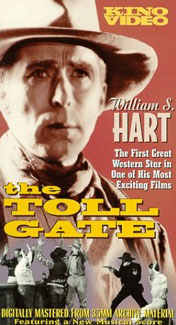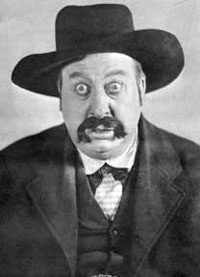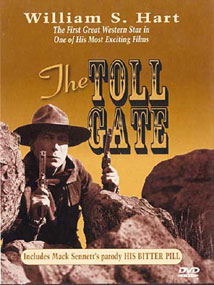Before Roy Rogers, before Gene Autrey, there was William S. Hart, who plays outlaw Black Deering in The Toll Gate (1920).
For three years his gang of wild west outlaws have been evading the law, & it's tough not being able to walk down any town street without fear. Their leader Black Deering gathers his men in their cavern hide-out & he admits he wants to dissolve the gang & slip back into honest society.
 His gang does not agree. Deering gives way to the wishes of the many, & agrees to "one more" train hold up, for $40,000 in gold. After that, he hopes his gang will reconsider the issue of their collective reform. His gang does not agree. Deering gives way to the wishes of the many, & agrees to "one more" train hold up, for $40,000 in gold. After that, he hopes his gang will reconsider the issue of their collective reform.
As in all "one more" robbery tales, it turns out truly to have been one too many. The train is well guarded by soldiers who had advance warning of the plot. The gang is destroyed thanks to one of its own members, a Judas.
Deering is recognized as the same man who a few years previous had warned soldiers of a pending Apache attack. The soldiers are disheartened that the man they have to hang is a notably a good man, while Jordan (), the gang's Judas, goes free with his blood money.
Deering's guards on the train more or less allow him to escape. Some while later, alone & always evading the law, he wanders into a town where Jordan used his blood money to set himself up in business.
Heroes would just never be this morally ambiguous in the later heyday of B westerns, but for the unusual character of Black Deering, setting fire to Jordan's cantina is justified by the betrayer having caused the deaths of friends.
But at the same time he committed armed robbery to get his next stake, & that was strictly for his own gain. For a guy who wanted to reform, arson & robbery come pretty easy for him.
Doubly pursued by an official posse & by Jordan with his band of Mexicans, Deering makes a dash for the border.
Deering reveals his potential for having been that white-hat hero, when he saves a small boy from drowning, endearing himself to the single mother, Mary Brown (). In repayment him, she assists him against his pursuers, & romance ensues.
The tale goes all cornpone when a chance encounter with a bible confirms Deering to change his ways rather than rape Mary Brown.
It remains only for the final confrontation with Jordan & a chance to risk death redeeming himself. When he's a proven hero after all, the posse & sheriff decide that since they're by now across the boarder, they're out of their jurisdiction. The happy-ever-after syrupy close totally forgets he burnt down half the town.
 The goofy Max Sennett parody, His Bitter Pill (1916), spoofs such earnest westerns as starred William S. Hart. So why not include it as an "extra" with the dvd release of Hart's The Toll Gate.
The goofy Max Sennett parody, His Bitter Pill (1916), spoofs such earnest westerns as starred William S. Hart. So why not include it as an "extra" with the dvd release of Hart's The Toll Gate.
While big-hearted Sheriff Jim (Mack Swain) breaks up a bar fight, his handsome rival Diamond Dan (Edgar Kennedy) puts the moves on Nell (Louella Maxam), the girl the sheriff loves.
Torn between the attentions of two men, Nell at first prefers the fat, homely, comedic, but honest & reliable sheriff. Slowly, however, Diamond Dan's villainous good looks begin to have an effect on her.
"Jim, I always loved you -- as a brother," she reveals, & chooses the rival, to Jim's pitiful sorrow. He goes home to his mommy (Ella Haines) & throws himself about the room in misery.
Nell is happy at first but soon her poor choice for a sweetheart is robbing a stagecoach. Brave Jim goes after the gang alone, with bullets flying. Diamond Jim flees home & hides in the chimney, so Jim starts a fire & smokes the thief onto the roof.
Nell begs him to let the highwayman go, & for undying love he does so. But having failed to uphold the law, he soonafter turns in his badge.
Foolish Nell finds herself living a hellish life on the road with the criminal. Eventually a rather ridiculous bar brawl & horse chase will give Jim his chance to save the damsel in distress once & for all.
It's a bad, bad little two-reel movie but as an early spoof of the very cliches other films committed with pokerfaces, His Bitter Pill has some historical interest in the development of the B-western film genre.
copyright © by Paghat the Ratgirl
|

 His gang does not agree. Deering gives way to the wishes of the many, & agrees to "one more" train hold up, for $40,000 in gold. After that, he hopes his gang will reconsider the issue of their collective reform.
His gang does not agree. Deering gives way to the wishes of the many, & agrees to "one more" train hold up, for $40,000 in gold. After that, he hopes his gang will reconsider the issue of their collective reform.